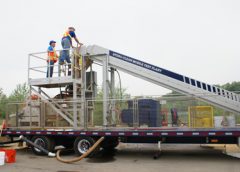W.S. Tyler, St. Catharines, Ontario, Canada, and Kemper Equipment, Honey Brook, Pa., demonstrated Hydro-Clean Mobile Test Plant at R.E. Pierson’s quarry operation in Bridgeport, N.J., on May 22. Rock Products Editor Mark Kuhar attended the demonstration.
W.S. Tyler utilized its Hydro-Clean Mobile Test Plant at the site, which enables operations to test Hydro-Clean washing technology before committing to a capital investment. Aggregates producers from Pennsylvania and New Jersey attended the event, and each transported a few tons of material from their own quarry to see how the unit performed.
“Supplying some of this equipment can be inconvenient for many customers,” said Michael Honea, W.S. Tyler process engineer. “The new Mobile Test Plant is completely self-contained to make testing as easy as possible for our customers, and provides results that clearly illustrate how the technology can add value to their operations.”
The actual full-sized Hydro-Clean washing unit from W.S. Tyler is designed to clean deleterious material from aggregate, recycled and other minerals while reducing water consumption by up to 75 percent.
Ideal for use in clay-heavy material deposits, dirty material is fed via hopper to a vertical washing drum, where high-pressure nozzles mounted at the top rotate and spray the material with water. The water streams spread and wash the material at pressures of up to 2,900 psi, effectively interacting with the material to break up agglomerates and clean the particles of stubborn material.
The turbulence in the drum creates additional scrubbing and abrasive forces that enhance the cleaning process as the material travels down the drum cylinder. High-pressure streams of water are injected into areas of the rock (holes, cracks, etc.) that are difficult to reach with traditional cleaning methods like log washers or screws – creating a cleaner product that generates higher selling value. In addition, many producers use this unit to turn material that was once dirty waste into revenue.
Due to its compact size and weight, overall operating and structural costs are considerably lower than with traditional washing systems ¬– which also require more equipment and a greater footprint.
The Hydro-Clean consumes little water and power, the company said. Water consumption ranges from 27 to 211 gpm, depending on application and model size – compared to log washers that can require up to 800 gpm of water. Power requirements for the Hydro-Clean are no greater than 300 hp (225 kW) on its largest model.
The Hydro-Clean is available in four model sizes that produce 18 to 360 tph depending on the application.

